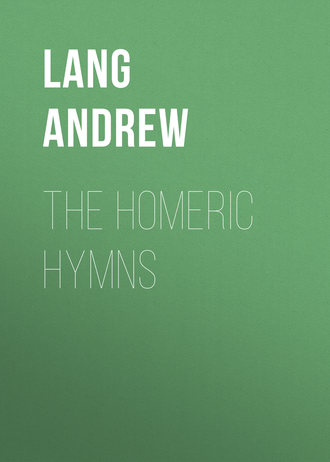
Lang Andrew
The Homeric Hymns
Therewith the Goddess changed her shape and height, and cast off old age, and beauty breathed about her, and the sweet scent was breathed from her fragrant robes, and afar shone the light from the deathless body of the Goddess, the yellow hair flowing about her shoulders, so that the goodly house was filled with the splendour as of levin fire, and forth from the halls went she.
But anon the knees of the woman were loosened, and for long time she was speechless, nay, nor did she even mind of the child, her best beloved, to lift him from the floor. But the sisters of the child heard his pitiful cry, and leapt from their fair-strewn beds; one of them, lifting the child in her hands, laid it in her bosom; and another lit fire, and the third ran with smooth feet to take her mother forth from the fragrant chamber. Then gathered they about the child, and bathed and clad him lovingly, yet his mood was not softened, for meaner nurses now and handmaids held him.
They the long night through were adoring the renowned Goddess, trembling with fear, but at the dawning they told truly to mighty Celeus all that the Goddess had commanded; even Demeter of the goodly garland. Thereon he called into the market-place the many people, and bade them make a rich temple, and an altar to fair-tressed Demeter, upon the jutting rock. Then anon they heard and obeyed his voice, and as he bade they builded. And the child increased in strength by the Goddess’s will.
Now when they had done their work, and rested from their labours, each man started for his home, but yellow-haired Demeter, sitting there apart from all the blessed Gods, abode, wasting away with desire for her deep-bosomed daughter. Then the most dread and terrible of years did the Goddess bring for mortals upon the fruitful earth, nor did the earth send up the seed, for Demeter of the goodly garland concealed it. Many crooked ploughs did the oxen drag through the furrows in vain, and much white barley fell fruitless upon the land. Now would the whole race of mortal men have perished utterly from the stress of famine, and the Gods that hold mansions in Olympus would have lost the share and renown of gift and sacrifice, if Zeus had not conceived a counsel within his heart.
First he roused Iris of the golden wings to speed forth and call the fair-tressed Demeter, the lovesome in beauty. So spake Zeus, and Iris obeyed Zeus, the son of Cronos, who hath dark clouds for his tabernacle, and swiftly she sped adown the space between heaven and earth. Then came she to the citadel of fragrant Eleusis, and in the temple she found Demeter clothed in dark raiment, and speaking wingèd words addressed her: “Demeter, Father Zeus, whose counsels are imperishable, bids thee back unto the tribes of the eternal Gods. Come thou, then, lest the word of Zeus be of no avail.” So spake she in her prayer, but the Goddess yielded not. Thereafter the Father sent forth all the blessed Gods, all of the Immortals, and coming one by one they bade Demeter return, and gave her many splendid gifts, and all honours that she might choose among the immortal Gods. But none availed to persuade by turning her mind and her angry heart, so stubbornly she refused their sayings. For she deemed no more for ever to enter fragrant Olympus, and no more to allow the earth to bear her fruit, until her eyes should behold her fair-faced daughter.
But when far-seeing Zeus, the lord of the thunder-peal, had heard the thing, he sent to Erebus the slayer of Argos, the God of the golden wand, to win over Hades with soft words, and persuade him to bring up holy Persephone into the light, and among the Gods, from forth the murky gloom, that so her mother might behold her, and that her anger might relent. And Hermes disobeyed not, but straightway and speedily went forth beneath the hollow places of the earth, leaving the home of Olympus. That King he found within his dwelling, sitting on a couch with his chaste bedfellow, who sorely grieved for desire of her mother, that still was cherishing a fell design against the ill deeds of the Gods. Then the strong slayer of Argos drew near and spoke: “Hades of the dark locks, thou Prince of men out-worn, Father Zeus bade me bring the dread Persephone forth from Erebus among the Gods, that her mother may behold her, and relent from her anger and terrible wrath against the Immortals, for now she contrives a mighty deed, to destroy the feeble tribes of earth-born men by withholding the seed under the earth. Thereby the honours of the Gods are minished, and fierce is her wrath, nor mingles she with the Gods, but sits apart within the fragrant temple in the steep citadel of Eleusis.”
So spake he, and smiling were the brows of Aidoneus, Prince of the dead, nor did he disobey the commands of King Zeus, as speedily he bade the wise Persephone: “Go, Persephone, to thy dark-mantled mother, go with a gentle spirit in thy breast, nor be thou beyond all other folk disconsolate. Verily I shall be no unseemly lord of thine among the Immortals, I that am the brother of Father Zeus, and whilst thou art here shalt thou be mistress over all that lives and moves, but among the Immortals shalt thou have the greatest renown. Upon them that wrong thee shall vengeance be unceasing, upon them that solicit not thy power with sacrifice, and pious deeds, and every acceptable gift.”
So spake he, and wise Persephone was glad; and joyously and swiftly she arose, but the God himself, stealthily looking around her, gave her sweet pomegranate seed to eat, and this he did that she might not abide for ever beside revered Demeter of the dark mantle. 82 Then openly did Aidoneus, the Prince of all, get ready the steeds beneath the golden chariot, and she climbed up into the golden chariot, and beside her the strong Slayer of Argos took reins and whip in hand, and drove forth from the halls, and gladly sped the horses twain. Speedily they devoured the long way; nor sea, nor rivers, nor grassy glades, nor cliffs, could stay the rush of the deathless horses; nay, far above them they cleft the deep air in their course. Before the fragrant temple he drove them, and checked them where dwelt Demeter of the goodly garland, who, when she beheld them, rushed forth like a Mænad down a dark mountain woodland. 83
[But Persephone on the other side rejoiced to see her mother dear, and leaped to meet her; but the mother said, “Child, in Hades hast thou eaten any food? for if thou hast not] then with me and thy father the son of Cronos, who has dark clouds for his tabernacle, shalt thou ever dwell honoured among all the Immortals. But if thou hast tasted food, thou must return again, and beneath the hollows of the earth must dwell in Hades a third portion of the year; yet two parts of the year thou shalt abide with me and the other Immortals. When the earth blossoms with all manner of fragrant flowers, then from beneath the murky gloom shalt thou come again, a mighty marvel to Gods and to mortal men. Now tell me by what wile the strong host of many guests deceived thee?.. ”
Then fair Persephone answered her august mother: “Behold, I shall tell thee all the truth without fail. I leaped up for joy when boon Hermes, the swift messenger, came from my father Cronides and the other heavenly Gods, with the message that I was to return out of Erebus, that so thou mightest behold me, and cease thine anger and dread wrath against the Immortals. Thereon Hades himself compelled me to taste of a sweet pomegranate seed against my will. And now I will tell thee how, through the crafty device of Cronides my father, he ravished me, and bore me away beneath the hollows of the earth. All that thou askest I will tell thee. We were all playing in the lovely meadows, Leucippe and Phaino, and Electra, and Ianthe, and Melitê, and Iachê, and Rhodeia, and Callirhoe, and Melobosis, and Tuchê, and flower-faced Ocyroe, and Chræsis, and Ianeira, and Acastê, and Admetê, and Rhodope, and Plouto, and winsome Calypso, and Styx, and Urania, and beautiful Galaxaurê. We were playing there, and plucking beautiful blossoms with our hands; crocuses mingled, and iris, and hyacinth, and roses, and lilies, a marvel to behold, and narcissus, that the wide earth bare, a wile for my undoing. Gladly was I gathering them when the earth gaped beneath, and therefrom leaped the mighty Prince, the host of many guests, and he bare me against my will despite my grief beneath the earth, in his golden chariot; and shrilly did I cry. This all is true that I tell thee.”
So the livelong day in oneness of heart did they cheer each other with love, and their minds ceased from sorrow, and great gladness did either win from other. Then came to them Hekatê of the fair wimple, and often did she kiss the holy daughter of Demeter, and from that day was her queenly comrade and handmaiden; but to them for a messenger did far-seeing Zeus of the loud thunder-peal send fair-tressed Rhea to bring dark-mantled Demeter among the Gods, with pledge of what honour she might choose among the Immortals. He vowed that her daughter, for the third part of the revolving year, should dwell beneath the murky gloom, but for the other two parts she should abide with her mother and the other gods.
Thus he spake, and the Goddess disobeyed not the commands of Zeus. Swiftly she sped down from the peaks of Olympus, and came to fertile Rarion; fertile of old, but now no longer fruitful; for fallow and leafless it lay, and hidden was the white barley grain by the device of fair-ankled Demeter. None the less with the growing of the Spring the land was to teem with tall ears of corn, and the rich furrows were to be heavy with corn, and the corn to be bound in sheaves. There first did she land from the unharvested ether, and gladly the Goddesses looked on each other, and rejoiced in heart, and thus first did Rhea of the fair wimple speak to Demeter:
“Hither, child; for he calleth thee, far-seeing Zeus, the lord of the deep thunder, to come among the Gods, and has promised thee such honours as thou wilt, and hath decreed that thy child, for the third of the rolling year, shall dwell beneath the murky gloom, but the other two parts with her mother and the rest of the Immortals. So doth he promise that it shall be and thereto nods his head; but come, my child, obey, and be not too unrelenting against the Son of Cronos, the lord of the dark cloud. And anon do thou increase the grain that bringeth life to men.”
So spake she, and Demeter of the fair garland obeyed. Speedily she sent up the grain from the rich glebe, and the wide earth was heavy with leaves and flowers: and she hastened, and showed the thing to the kings, the dealers of doom; to Triptolemus and Diocles the charioteer, and mighty Eumolpus, and Celeus the leader of the people; she showed them the manner of her rites, and taught them her goodly mysteries, holy mysteries which none may violate, or search into, or noise abroad, for the great curse from the Gods restrains the voice. Happy is he among deathly men who hath beheld these things! and he that is uninitiate, and hath no lot in them, hath never equal lot in death beneath the murky gloom.
Now when the Goddess had given instruction in all her rites, they went to Olympus, to the gathering of the other Gods. There the Goddesses dwell beside Zeus the lord of the thunder, holy and revered are they. Right happy is he among mortal men whom they dearly love; speedily do they send as a guest to his lofty hall Plutus, who giveth wealth to mortal men. But come thou that holdest the land of fragrant Eleusis, and sea-girt Paros, and rocky Antron, come, Lady Deo! Queen and giver of goodly gifts, and bringer of the Seasons; come thou and thy daughter, beautiful Persephone, and of your grace grant me goodly substance in requital of my song; but I will mind me of thee, and of other minstrelsy.
V. TO APHRODITÉ
I shall sing of the revered Aphrodité, the golden-crowned, the beautiful, who hath for her portion the mountain crests of sea-girt Cyprus. Thither the strength of the west wind moistly blowing carried her amid soft foam over the wave of the resounding sea. Her did the golden-snooded Hours gladly welcome, and clad her about in immortal raiment, and on her deathless head set a well-wrought crown, fair and golden, and in her ears put earrings of orichalcum and of precious gold. Her delicate neck and white bosom they adorned with chains of gold, wherewith are bedecked the golden-snooded Hours themselves, when they come to the glad dance of the Gods in the dwelling of the Father. Anon when they had thus adorned her in all goodliness they led her to the Immortals, who gave her greeting when they beheld her, and welcomed her with their hands; and each God prayed that he might lead her home to be his wedded wife, so much they marvelled at the beauty of the fair-garlanded Cytherean. Hail, thou of the glancing eyes, thou sweet winsome Goddess, and grant that I bear off the victory in this contest, and lend thou grace to my song, while I shall both remember thee and another singing.
VI. TO DIONYSUS
Concerning Dionysus the son of renowned Semele shall I sing; how once he appeared upon the shore of the sea unharvested, on a jutting headland, in form like a man in the bloom of youth, with his beautiful dark hair waving around him, and on his strong shoulders a purple robe. Anon came in sight certain men that were pirates; in a well-wrought ship sailing swiftly on the dark seas: Tyrsenians were they, and Ill Fate was their leader, for they beholding him nodded each to other, and swiftly leaped forth, and hastily seized him, and set him aboard their ship rejoicing in heart, for they deemed that he was the son of kings, the fosterlings of Zeus, and they were minded to bind him with grievous bonds. But him the fetters held not, and the withes fell far from his hands and feet. 84 There sat he smiling with his dark eyes, but the steersman saw it, and spake aloud to his companions: “Fools, what God have ye taken and bound? a strong God is he, our trim ship may not contain him. Surely this is Zeus, or Apollo of the Silver Bow, or Poseidon; for he is nowise like mortal man, but like the Gods who have mansions in Olympus. Nay, come let us instantly release him upon the dark mainland, nor lay ye your hands upon him, lest, being wroth, he rouse against us masterful winds and rushing storm.”
So spake he, but their captain rebuked him with a hateful word: “Fool, look thou to the wind, and haul up the sail, and grip to all the gear, but this fellow will be for men to meddle with. Methinks he will come to Egypt, or to Cyprus, or to the Hyperboreans, or further far; and at the last he will tell us who his friends are, and concerning his wealth, and his brethren, for the God has delivered him into our hands.”
So spake he, and let raise the mast and hoist the mainsail, and the wind filled the sail, and they made taut the ropes all round. But anon strange matters appeared to them: first there flowed through all the swift black ship a sweet and fragrant wine, and the ambrosial fragrance arose, and fear fell upon all the mariners that beheld it. And straightway a vine stretched hither and thither along the sail, hanging with many a cluster, and dark ivy twined round the mast blossoming with flowers, and gracious fruit and garlands grew on all the thole-pins; and they that saw it bade the steersman drive straight to land. Meanwhile within the ship the God changed into the shape of a lion at the bow; and loudly he roared, and in midship he made a shaggy bear: such marvels he showed forth: there stood it raging, and on the deck glared the lion terribly. Then the men fled in terror to the stern, and there stood in fear round the honest pilot. But suddenly sprang forth the lion and seized the captain, and the men all at once leaped overboard into the strong sea, shunning dread doom, and there were changed into dolphins. But the God took pity upon the steersman, and kept him, and gave him all good fortune, and spake, saying, “Be of good courage, Sir, dear art thou to me, and I am Dionysus of the noisy rites whom Cadmeian Semele bare to the love of Zeus.” Hail, thou child of beautiful Semele, none that is mindless of thee can fashion sweet minstrelsy.
VII. TO ARES
Ares, thou that excellest in might, thou lord of the chariot of war, God of the golden helm, thou mighty of heart, thou shield-bearer, thou safety of cities, thou that smitest in mail; strong of hand and unwearied valiant spearman, bulwark of Olympus, father of victory, champion of Themis; thou tyrannous to them that oppose thee with force; thou leader of just men, thou master of manlihood, thou that whirlest thy flaming sphere among the courses of the seven stars of the sky, where thy fiery steeds ever bear thee above the third orbit of heaven; do thou listen to me, helper of mortals, Giver of the bright bloom of youth. Shed thou down a mild light from above upon this life of mine, and my martial strength, so that I may be of avail to drive away bitter cowardice from my head, and to curb the deceitful rush of my soul, and to restrain the sharp stress of anger which spurs me on to take part in the dread din of battle. But give me heart, O blessed one, to abide in the painless measures of peace, avoiding the battle-cry of foes and the compelling fates of death.
VIII. TO ARTEMIS
Sing thou of Artemis, Muse, the sister of the Far-darter; the archer Maid, fellow-nursling with Apollo, who waters her steeds in the reedy wells of Meles, then swiftly drives her golden chariot through Smyrna to Claros of the many-clustered vines, where sits Apollo of the Silver Bow awaiting the far-darting archer maid. And hail thou thus, and hail to all Goddesses in my song, but to thee first, and beginning from thee, will I sing, and so shall pass on to another lay.
IX. TO APHRODITE
I shall sing of Cytherea, the Cyprus-born, who gives sweet gifts to mortals, and ever on her face is a winsome smile, and ever in her hand a winsome blossom. Hail to thee, Goddess, Queen of fair-set Salamis, and of all Cyprus, and give to me song desirable, while I shall be mindful of thee and of another song.
X. TO ATHENE
Of Pallas Athene, the saviour of cities, I begin to sing; dread Goddess, who with Ares takes keep of the works of war, and of falling cities, and battles, and the battle din. She it is that saveth the hosts as they go and return from the fight. Hail Goddess, and give to us happiness and good fortune.
XI. TO HERA
I sing of golden-throned Hera, whom Rhea bore, an immortal queen in beauty pre-eminent, the sister and the bride of loud-thundering Zeus, the lady renowned, whom all the Blessed throughout high Olympus honour and revere no less than Zeus whose delight is the thunder.
XII. TO DEMETER
Of fair-tressed Demeter the holy Goddess I begin to sing; of her and the Maiden, the lovely Persephone. Hail Goddess, and save this city and inspire my song.
XIII. TO THE MOTHER OF THE GODS
Sing for me, clear-voiced Muse, daughter of great Zeus, the mother of all Gods and all mortals, who is glad in the sound of rattles and drums, and in the noise of flutes, and in the cry of wolves and fiery-eyed lions, and in the echoing hills, and the woodland haunts; even so hail to thee and to Goddesses all in my song.
XIV. TO HERACLES THE LION-HEART
Of Heracles the son of Zeus will I sing, mightiest of mortals, whom Alcmena bore in Thebes of the fair dancing places, for she had lain in the arms of Cronion, the lord of the dark clouds. Of old the hero wandered endlessly over land and sea, at the bidding of Eurystheus the prince, and himself wrought many deeds of fateful might, and many he endured; but now in the fair haunts of snowy Olympus he dwells in joy, and hath white-ankled Hebe for his wife. Hail prince, son of Zeus, and give to us valour and good fortune.
XV. TO ASCLEPIUS
Of the healer of diseases, Asclepius, I begin to sing, the son of Apollo, whom fair Coronis bore in the Dotian plain, the daughter of King Phlegyas; a great joy to men was her son, and the soother of evil pains. Even so do thou hail, O Prince, I pray to thee in my song.







